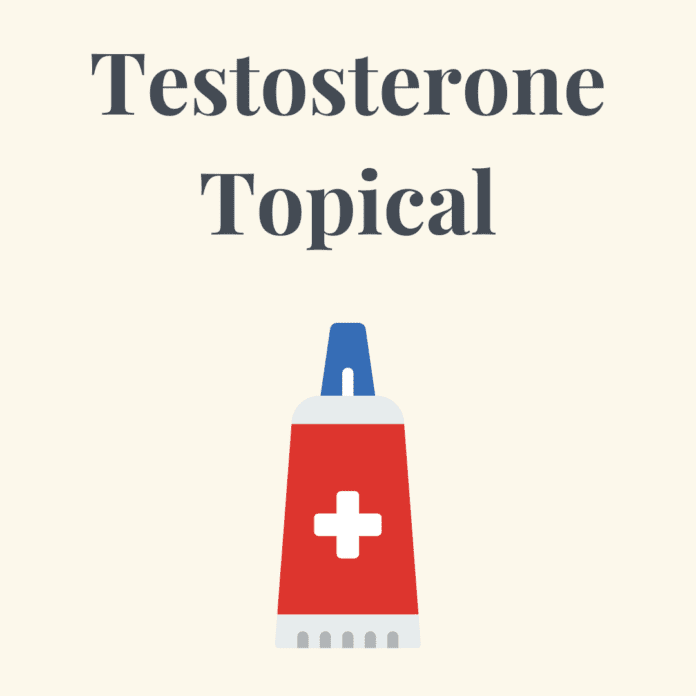Uses Of Testosterone Topical
Testosterone topical is used to treat the symptoms of low testosterone in adult men who have hypogonadism (a condition in which the body does not produce enough natural testosterone). Testosterone is used only for men with low testosterone levels caused by certain medical conditions, including disorders of the testicles, pituitary gland (a small gland in the brain), or hypothalamus (a part of the brain) that cause hypogonadism. Your doctor will order certain tests to check your testosterone levels to see if they are low before you begin to use testosterone topical. Testosterone should not be used to treat the symptoms of low testosterone in men who have low testosterone due to aging (‘age-related hypogonadism’). Testosterone is in a class of medications called androgenic hormones.
Testosterone is a hormone produced by the body that contributes to the growth, development, and functioning of the male sexual organs and typical male characteristics. Testosterone topical works by replacing the testosterone that is normally produced by the body.
Side Effects Of Testosterone Topical
Testosterone topical may cause side effects. Tell your doctor if any of these symptoms are severe or do not go away:
- breast enlargement and/or pain
- decreased sexual desire
- acne
- depression
- mood changes
- headache
- teary eyes
- dry or itchy skin
- diarrhea
- skin redness or irritation
Some side effects can be serious. If you experience any of the following symptoms, call your doctor immediately:
- lower leg pain, swelling, warmth, or redness
- shortness of breath
- swelling of the hands, feet, ankles, or lower legs
- nausea or vomiting
- slow or difficult speech
- dizziness or faintness
- weakness or numbness of an arm or leg
- chest pain
- difficulty breathing, especially during sleep
- erections that happen too often or that last too long
- difficulty urinating weak urine flow, frequent urination, sudden need to urinate right away
- yellowing of the skin or eyes
- Testosterone topical may cause a decrease in the number of sperm (male reproductive cells) produced, especially if it is used at high doses. Talk to your doctor about the risks of using this medication if you are a man and would like to have children.
- Testosterone may increase the risk of developing prostate cancer. Talk to your doctor about the risks of using this medication.
Testosterone topical may cause other side effects. Call your doctor if you have any unusual problems while using this medication.
Warnings & Precautions
Before using testosterone gel:
- tell your doctor and pharmacist if you are allergic to testosterone, any other medications, or any of the ingredients in topical testosterone products. Ask your pharmacist for a list of the ingredients.
- tell your doctor and pharmacist what prescription and nonprescription medications, vitamins, nutritional supplements, and herbal products you are taking or plan to take. Be sure to mention any of the following: anticoagulants (blood thinners) such as warfarin (Coumadin, Jantoven); insulin (Apridra, Humalog, Humulin, others); and oral steroids such as dexamethasone, methylprednisolone (Medrol), and prednisone (Rayos). Your doctor may need to change the doses of your medications or monitor you carefully for side effects.
- tell your doctor if you have breast cancer or have or may have prostate cancer. Your doctor will probably tell you that you should not use testosterone topical.
- tell your doctor if you have or have ever had sleep apnea (breathing stops for short periods of time during sleep), benign prostate hyperplasia (BPH; an enlarged prostate); high blood levels of calcium; diabetes; or heart, kidney, liver, or lung disease.
- talk to your doctor about the risks and benefits of using topical testosterone if you are 65 years of age or older. Older men should not usually use topical testosterone, unless they have hypogonadism.
- you should know that there have been reports of serious side effects in people who use testosterone at higher doses, along with other male sex hormone products, or in ways other than directed by a doctor. These side effects may include a heart attack, heart failure, or other heart problems; stroke and mini-stroke; liver disease; seizures; or mental health changes such as depression, mania (frenzied, abnormally excited mood), aggressive or unfriendly behavior, hallucinations (seeing things or hearing voices that do not exist), or delusions (having strange thoughts or beliefs that have no basis in reality). People who use higher doses of testosterone than recommended by a doctor may also experience withdrawal symptoms such as depression, extreme tiredness, craving, irritability, restlessness, loss of appetite, inability to fall asleep or stay asleep, or a decreased sex drive if they suddenly stop using testosterone topical. Be sure to use testosterone topical exactly as directed by your doctor.
Other
Keep all appointments with your doctor and the laboratory. Your doctor will order certain lab tests to check your body’s response to testosterone.
Before having any laboratory test, tell your doctor and the laboratory personnel that you are using testosterone topical.
Do not let anyone else use your medication. Testosterone topical is a controlled substance. Prescriptions may be refilled only a limited number of times; ask your pharmacist if you have any questions.
It is important for you to keep a written list of all of the prescription and nonprescription (over-the-counter) medicines you are taking, as well as any products such as vitamins, minerals, or other dietary supplements. You should bring this list with you each time you visit a doctor or if you are admitted to a hospital. It is also important information to carry with you in case of emergencies.
Source
All information has been provided courtesy of MedLinePlus from the National Library of Medicine and from the FDA.



